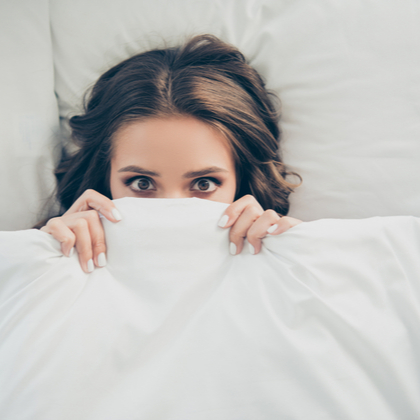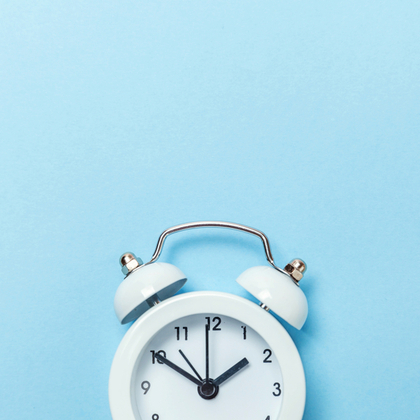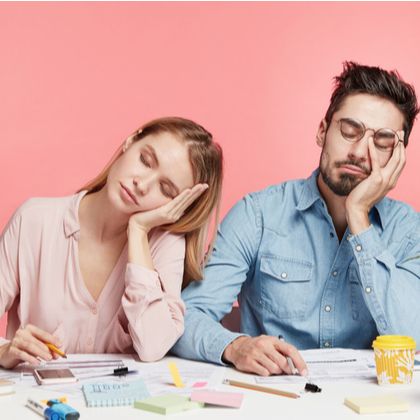
There’s nothing more frustrating than drifting off to sleep only to wake up at 4 am. Time moves differently during the early hours. You may suddenly become consumed with worry about your finances, the climate crisis, or the work meeting you have in the morning. And no matter how hard you try to fall back to sleep, rest just seems to evade you. Feeling frustrated is an understatement.
If you wake in the middle of the night, don’t worry; it happens to everyone at some point. Having strategies and rituals in your back pocket can help enormously.
How to get back to sleep at 4am
Don’t check the clock (or your phone)
If you know you’re waking up at precisely 4.26 am, that could be where you’re going wrong. Looking at the time can trigger anxiety and prevent you from getting back to sleep.
The same goes for your phone. Besides seeing the time – which can alarm you in its own right – even a brief look at your phone will emanate blue light directly into your eyes. Blue light suppresses melatonin (the sleep hormone) and tricks your brain into thinking it's daytime, making it even harder to drift off again (1).
We suggest leaving your phone – and all other technology – outside your bedroom at night to prevent the temptation of using it in twilight hours.
If you want an alarm clock in your bedroom, choose an old-fashioned one and turn it away from you.
Keep the lights off
On the subject of blue light, keep the lights off if you wake up during the night, as it will only disturb your sleep even more.
As a rule, try to ensure your bedroom is as dark as possible before going to bed. Absolute darkness is critical for secreting the sleep hormone melatonin (2).
Light seeping through your window or hallway could rouse you during the night. Consider fitting blackout blinds, wearing a comfortable eye mask, turning all the lights off in the house, or putting a draft excluder underneath your bedroom door.
Wear earplugs
Noise can also wake you up at night, especially if you live in a busy urban area, share with others, or have a loud bed partner. Wearing earplugs is a simple way to block background noise and ensure uninterrupted sleep is on the cards.
Focus on your breath
Often, the most frustrating thing about sleep is that it doesn’t respond well to effort. So, instead of concentrating on falling back to sleep – and getting exasperated – pay attention to your breath.
Not only will conscious breathing redirect your focus, but it will help downregulate your nervous system – which is probably hyper-aroused and overactivated – and put you in a state of ‘rest and digest’.
One of the best exercises is the 4-7-8 breath. Inhale through your nose for 4 seconds, hold your breath for 7 seconds, and exhale through your mouth for 8 seconds.
Discover more relaxation techniques for sleep here.
Try to stay awake
In some cases, trying to stay awake may induce sleep. This is called ‘paradoxical intention’. As with conscious breathing, this exercise redirects your focus away from fretting about not sleeping, hopefully resulting in rest. Simply lie down and keep your eyes open (actually very hard!).
Wait for your alarm to go off
If you stir at 4 am, it can be tempting to get up before your alarm goes off. But we encourage you to stay in bed.
If you can get yourself into a relaxed headspace – perhaps with the help of the breathing exercises above – chances are, you’ll drift back to sleep. Even an extra 15-20 minutes can help you feel refreshed and restored.
Be careful with alcohol
Long known as a ‘nightcap’, alcohol does anything but support restful sleep. In the first half of the night – as your body metabolises alcohol – you’ll probably fall asleep quicker and spend more time in deep sleep.
However, once your liver enzymes eliminate the alcohol and any of its sedative effects wear off, your body will experience a ‘rebound effect’: you will transition from deeper to lighter sleep, which can cause frequent night-time arousals (3). So, it's not uncommon to find yourself awake at 4 am even though your body needs more rest.
Reducing your alcohol consumption is a sensible place to start if you want to prioritise your sleep quality and avoid waking up in the early hours of the morning.
Healthy habits
Sleep often reflects the way you live. This means checking in with some essential pillars of health – nutrition, exercise, and relaxation – from the moment you wake up to the moment you go to bed.
Here are some non-negotiables for quality, uninterrupted rest:
-
Avoid caffeine at midday
-
Avoid drinking liquids an hour before bed
-
Leave 2-3 hours after your last meal and intense exercise before sleeping
-
Disconnect from devices around an hour before bed
-
Try to go to bed at the same time every night
You can read more about improving your sleep hygiene here.
Think about your nutrition
It’s all well and good having strategies to turn to in the middle of the night, but quality sleep can still escape you without good nutrition.
Vitamins for sleep
Magnesium
Involved in over 300 biochemical processes, magnesium supports normal psychological and nervous system function, making it a useful addition for sleep.
You can find magnesium in whole grains, dark chocolate, nuts, and seeds. You can also take a high-strength supplement to cover any nutritional shortfalls.
B vitamins
Many B vitamins are involved in normal psychological function, including vitamins B1 and B12, and nervous system function – namely, vitamins B2, B3, B6, and B7 – all important for sleep.
Fish, poultry, meat, eggs, green leafy vegetables, beans, and peas are packed with these B vitamins. However, you may want to invest in a comprehensive B complex to ensure a reliable supply.
PEA
PEA is an endocannabinoid-like compound found in almost every cell, tissue, and fluid, naturally produced when cells are damaged or threatened. It's a popular choice to support sleep hygiene and a well-researched alternative to CBD.
5 HTP
Griffonia seed extract contains 5 HTP (5-Hydroxytryptophan), which is the natural compound the body manufactures from the amino acid tryptophan. The brain converts 5-HTP into serotonin, the ‘feel-good’ neurotransmitter, which affects sleep, mood and appetite.
Theanine and lemon balm (melissa)
An amino acid found in green and black tea, L-theanine is known for its soothing properties. It’s often combined with the calming herb lemon balm (melissa) to support sleep.
Tart cherry juice
Rich in potent antioxidants called anthocyanidins, tart cherry juice is often recommended for sleep.
You can read more about tart cherry juice here.
Valerian
Valerian root is a traditional herb used for the temporary relief of sleep disturbances and mild anxiety.
Find out more
If you found this piece useful, you can find similar guidance on our dedicated Sleep Health Hub. Alternatively, please get in touch with our team of expert Nutrition Advisors, who are on hand to provide free, confidential advice via email, phone, and Live Chat.*
*Subject to cookie consent
References:
-
The influence of blue light on sleep, performance and wellbeing in young adults: A systematic review. Silvani MI, Werder R, Perret C. (2022) Front Physiol. 13:943108.
-
Melatonin, the Hormone of Darkness: From Sleep Promotion to Ebola Treatment. Masters, A., Pandi-Perumal, S. R., Seixas, A., Girardin, J. L., & McFarlane, S. I. (2014) Brain disorders & therapy. 4(1), 1000151.
-
Alcohol and the sleeping brain. Colrain IM, Nicholas CL, Baker FC. (2014) Handb Clin Neurol. 125:415-31.
Related Posts

Do I Have Symptoms Of Insomnia Or Just Trouble Sleeping?

Insomnia Treatments: Natural Remedies To Help You Fall Asleep

Why Am I Always Tired? Signs Of Poor Sleep Hygiene Explained

Olivia
Olivia Salter has always been an avid health nut. After graduating from the University of Bristol, she began working for a nutritional consultancy where she discovered her passion for all things wellness-related. There, she executed much of the company’s content marketing strategy and found her niche in health writing, publishing articles in Women’s Health, Mind Body Green, Thrive and Psychologies.
View More
